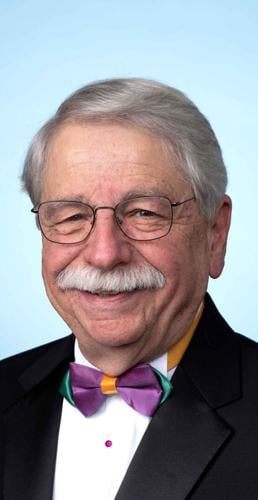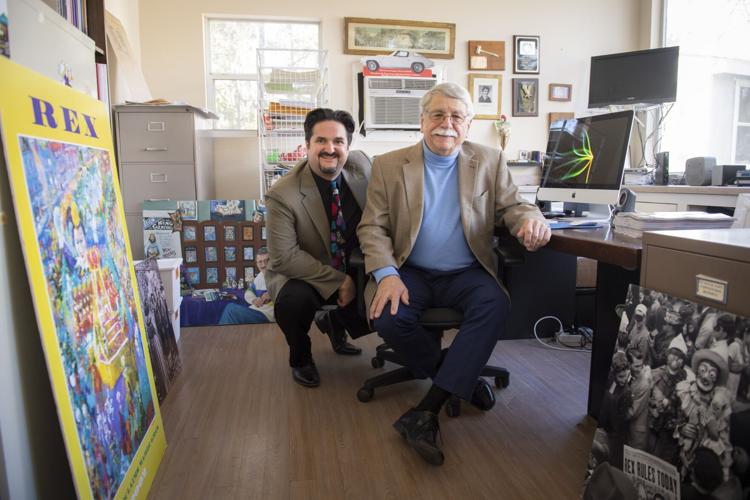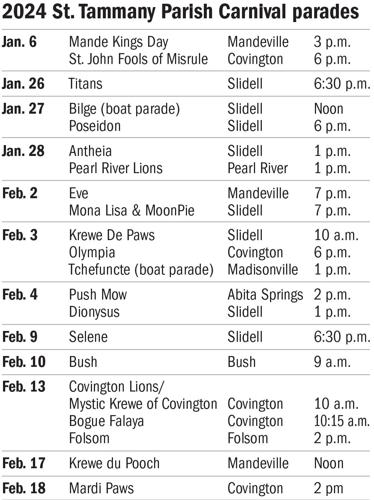"It's the most wonderful time of the year …"
Christmas? It's all right. But I'm talking about Carnival (or Mardi Gras, which many refer to as a season but actually is the final day, literally French for "Fat Tuesday," of Carnival).
Carnival (again, literally Latin for "farewell to flesh") is the great indulgence before the penance and purification we undergo during Lent. It's a preparation for the Christian celebration of Easter, part of church's liturgical calendar.
You can learn all this during 13 years of Catholic education, as I did, or, if you need a crash course, you can pick up a copy of Arthur Hardy's 2024 Mardi Gras Guide, which is for sale now across the greater New Orleans area.
Hardy, who grew up in New Orleans and started publishing the Mardi Gras Guide in 1977, is likely the most trusted source on all things about New Orleans' biggest celebration. He studies the stories of yesterday, and he's got today's scoop, too — down to knowing the throws each krewe will toss on St. Charles Avenue, Gause Boulevard or Boston Street.
With Hardy's 48th annual guide fresh on the racks — and with Mardi Gras foremost in many minds — St. Tammany Farmer and Tammany Picayune editor Andrew Canulette sat down with Hardy (who now lives in Mandeville) to discuss what we can expect from our biggest annual celebration.
Farmer: Mardi Gras is on one of the earliest dates it possibly can be in 2024. Does an early date affect how we celebrate, or am I the only person who feels unprepared for the can't-miss party of the year?
Hardy: It doesn’t so much affect the krewes. They know how to do this. But for businesses in general, an early date tends to be a factor. You go ‘Christmas and New Year’s, Sugar Bowl and whoops — here’s Mardi Gras.'
The king cake bakeries hate it. They can do, for the most part, about 500 cakes a day. So, if you have a 40 day-season opposed to a 60-day season, that’s 20 less days of selling king cake. That’s one effect right there.
It's never bothered me with the Mardi Gras Guide. People are either going to buy it or they're not.
But an early Carnival usually means the weather is normally not as good as when Mardi Gras is on a later date. It could be colder and rainier. But not necessarily. I mean, we’re in New Orleans, so who knows? But I think we'll have a good season. If merchants will keep Mardi Gras stuff on the counters and not Valentine’s Day candy.
Farmer: There’s an opportunity! Maybe we can get some purple, green and gold candy on the shelves. Maybe the Elmer Candy Company can make Mardi Gras chocolate bars, something like that?
Hardy: Great idea. Let’s try it!
Farmer: There’s been turnover in recent years with St. Tammany’s Carnival. We’ve lost a couple of parades, but we’re picking up some exciting new events.
Covington stands out, in particular, with the new Krewe of Bogue Falaya which looks like it’s going to be a big blowout on Mardi Gras. But, most interesting I think, is harkening back to the old tradition of the king of the city’s Carnival arriving by boat via the river on Lundi Gras. That, I think, speaks volumes about where we’ve been and where we’re heading with Carnival in St Tammany, yes?
Hardy: Absolutely! But at the same time, St. Tammany celebrations let it be known they want to be different from the ones in New Orleans. The season here is advertised as family-oriented. And it is. That’s not to say New Orleans isn't, but the crowds are a lot calmer over here. They’re smaller, and they still work.
What I like about St. Tammany is a group like the St. John Fools of Misrule in Covington. They’ve got something like a 2-block parade, but it's so much fun. People really get into it. Carnival in Covington has rebranded itself as the Krewe of Bogue Falaya, and that's a really big deal for them. They’re bringing back some old traditions, but the core remains.
It's something for everybody — staying the same but evolving too.
Farmer: I love the history because it gives us our own imprint.
Growing up in Slidell in the ‘70s and ‘80s, Mardi Gras was more or less an afterthought. Everything that I wanted to do as a kid was across the lake. That took organization, it took planning. It took finagling the parents into driving us over.
The traditions in the city, things like the Mardi Gras Indians, were ‘one-of-a-kind’ New Orleans. And now, the Fools of Misrule will have the Indians at their Kings Day celebration on Jan. 6. How big of a ‘get’ is that for a northshore organization?
Hardy: I think, perhaps, we’ve had one or two (Indians) here before, but not as a whole gang or tribe. Not that I know of. So, it’s a huge deal for them to be in Covington. … And who knows what other surprises will come our way? We hear there may be more, so we’ll just have to keep watching.
Farmer: Does the growth of Carnival in St. Tammany surprise you at all?
Hardy: I’ve been doing this a long time, but I still learn new things each year. … There was a time when we didn't even include St. Tammany parades in the book. I considered it a New Orleans publication and we published information about New Orleans’ parades only. I knew there were some clubs over here, but I really didn't care to go see them.
Then, a couple of buddies of mine said ‘Man, you're really missing out. Come to a parade over here. And gee whiz, were they right! I thought ‘People would like to know the story of Carnival in St. Tammany’, because I didn't know it. So, we expanded to include the whole parish in the guide. And we’re much better for it.
If you’ve never been over here for a parade, don’t think of it as only this quaint rustic celebration. There is some of that, but you’ll see some things that rival most anything in New Orleans, too. The Krewe of Poseidon, for instance, is as good as just about anything you’ll find. It’s that good.
Farmer: Why did Poseidon grow so quickly? They’re one of the biggest krewes in all of Carnival now, but only nine years old. Is it because they’re coed and make it a party for the whole family?
Hardy: There’s some of that, I suppose. But the biggest thing to making any organization successful is good leadership, and they have it.
Farmer: Sort of like Endymion grew from a small, neighborhood parade in Gentilly into a superkrewe under the leadership of (recently deceased captain) Ed Muniz?
Hardy: Exactly like that.
Farmer: In Slidell, there was an ordinance recently to compress the Carnival calendar into two weekends. It ultimately was moved to three with an eleventh-hour substitute ordinance. So we presume all is well.
On paper, it looked like the city was trying to take extra strain off its police and public works, which makes sense. But it could have cost the city at least one of its parades (the Krewe of Titans said it might have to fold if a two-weekend parade schedule was enforced.)
Don’t these parades mean money for the cities? What am I missing?
Hardy: I’m not quite sure the city understood what was happening in that situation. In that case, if we have to move all the parades into a two-week schedule, Titans basically would’ve been out of business. What’s the compromise? You either have three weeks or two. And if you have two, Titans is gone. It seems very much like an either/or choice.
Farmer: So, it remains important for our civic leaders to fully understand the economic impact of Carnival, right?
Hardy: It does, but it’s not just economics. It’s part of our history. It’s how we do things. When you spread a parade calendar over three weeks, you have smaller crowds and less competition for all the things you need to make a parade go.
Take for instance New Orleans, where there are more parades on the first weekend (two weekends before Mardi Gras) than there are on the so-called ‘Big Weekend’ right before Mardi Gras. There’s a real struggle for relevance, for media attention.
And what about the bands? There are only so many to go around and they’re a huge part of any parade. All of that needs to be considered. It takes so many moving parts to put a good parade on the streets.
Farmer: I noticed one St. Tammany krewe is selling space on the cups they throw to local businesses. You pay them to have your company logo on the cup, they throw them to the crowd and the money you fronted goes to charity.
I know you’ve advocated for keeping Carnival as commercial-free as possible. How does this strike you, in particular? Is it OK if the money is going to charity?
Hardy: I’m a purist. The purpose of a parade is not to promote, but only to have fun, to celebrate. But in some cases, it's necessary financially to have advertisers or sponsors.
With the money going to charity, that’s a completely different story. A lot of krewes have become very philanthropic in nature, and that’s really fantastic. But again, it’s not why we parade. It’s about the procession, the greatest free show on earth.
Farmer: What are you looking forward to most this Carnival, Arthur?
Hardy: Ash Wednesday (spoken without hesitation, and with a hearty laugh.)
Farmer: You’ve used that line a few times, haven’t you?
Hardy: Of course. Mardi Gras is my job. But what I look forward to most are the people. The parades, the floats, the parties — all of it is great. But it’s the people that move this thing, that move it along, that steer it.
It’s not just the joy of the event but of each other. I thought at some point I'd get tired of it, but I haven't so far.
Farmer: There is ebb and flow to everything, and it seems right now there is a flow to our Carnival, in New Orleans, in St. Tammany. People seem genuinely excited about the season in 2024. Do you feel that?
Hardy: Absolutely. We are on an uptick. If there was a positive effect of COVID on Mardi Gras, it was like the New Orleans Police strike in 1979. People didn’t know what we had until it was gone. They missed it terribly. So, there is an appreciation.
All of this is a labor of love for the people putting on the parades. It’s a free party for everyone else. The cities absolutely could cancel parades, but they could not force people to actually have a parade. Nobody makes us do this, but I'm so grateful that we do, and not just from a business standpoint.
I’m grateful because it's truly ours. This is what we do.
Farmer: And we do it better than anybody.
Hardy: There's no doubt about it. … It's genetically encoded in our DNA. We know how to party, and we do it better than anyone. Mobile has their thing, and God bless them for it. But it's not the same.
Farmer: Well, there's the perfect question to end the interview. If New Orleans and Mobile are forced to go 15 rounds in the ring in a Carnival prize fight, who wins the title 'Originator of Mardi Gras in North America?'
Hardy: Ha! It depends on who you talk to. Mobile had Mardi Gras-style parades beginning in 1831. But, and it's a big but, they were held on New Year's Eve until after the Civil War. Our first Mardi Gras parade was in 1857, but it was founded by six men from Mobile.
So, I like to say they had it first, but we showed them where to put it. And that's on Mardi Gras.

Be sure to check out Canulette's story on local walking krewe, the Mande Milkshakers, in the 48th edition of Arthur Hardy's Mardi Gras Guide.



